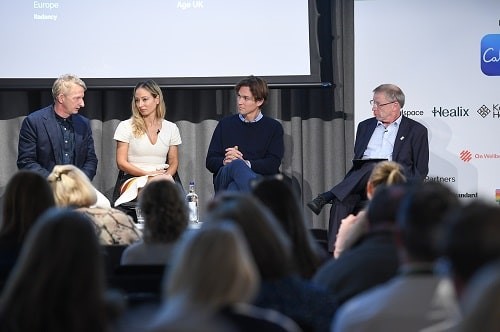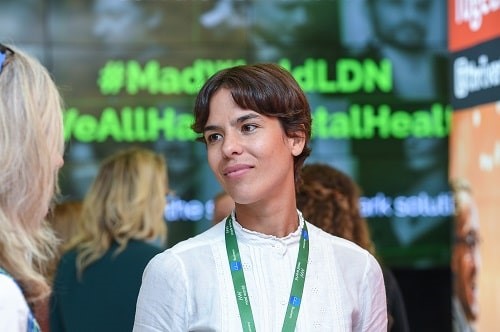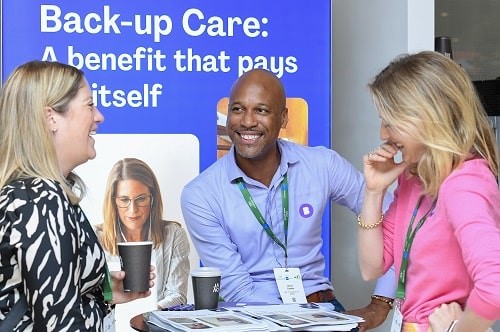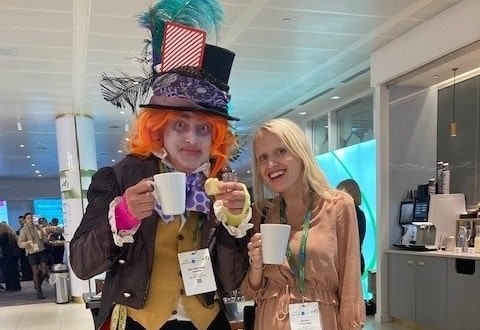There has always been a buzz about MAD World, the conference that stands for Make A Difference, held on 12 October in London.
News
Stimulating talks at MAD World, but audience brings much to the party
However, there was a sense that, in its sixth year, audiences at MAD World were now more clued up on wellbeing issues than ever before and hunting for insights that would enrich their already extensive knowledge.
Delegates could choose from four tracks of content, including panels, roundtables, case studies and workshops. More audience participation in workshops was helpful in this respect – giving an insight into the experiences of those on the shop floor and therefore, a pool of ideas and reflections we could all benefit from.
 Dr Wolfgang Seidl, Mariyana Zhou, Alex Will discuss the ‘workforce of the future’ with Paul Farmer. Photograph: MAD World
Dr Wolfgang Seidl, Mariyana Zhou, Alex Will discuss the ‘workforce of the future’ with Paul Farmer. Photograph: MAD World
A workshop on the science behind happiness and productivity revealed how wellbeing advice is proving hard to embed into practice. For example, walking meetings was recommended in 2017 by Public Health England to tackle chronic sedentarism in the workplace. But only six people in a room of 40 said they do this. One delegate shared that, at first, employees were worried about “not being seen at their desk, because it didn’t look productive” but slowly she said a culture change happened and walking meetings are now very acceptable in her company.
Then it was time to rush to a panel on ‘prevention and early intervention – how to keep your workforce engaged’. One audience member asked why wellbeing is seeming to be “getting worse” when the landscape of advice and services is growing. “There’s something not quite stacking up,” agreed Harry Bliss, CEO of Champion Health, who said that, according to the data they collect [across organisations it works with], 30 per cent of employees have moderate to severe levels of depression or anxiety and 11 per cent are experiencing a crisis.
 There was a sense that, in its sixth year, audiences at MAD World were now more clued up on wellbeing issues than ever before. Photograph: MAD World
There was a sense that, in its sixth year, audiences at MAD World were now more clued up on wellbeing issues than ever before. Photograph: MAD World
He said it’s crucial we “personalise” the wellbeing support we give to each employee and make it “relatable”. We need to progress on areas which have been ignored for too long, he added, particularly women’s and men’s health needs, financial wellbeing and musculoskeletal disorders. For Debbie Hamilton, nursing consultant at Healix Health, prevention was about “empowering people to ensure that they keep well”.
Safety Management’s next stop was a workshop on harnessing the power of data and AI for personalised and proactive wellbeing support at scale. Those delegates in charge of large numbers of employees were interested in how AI might deliver personalised health advice to them via machine learning. But for our neighbour, who worked in HR for a medical tech firm, new AI tool Chat GPT had not been so useful. Information it harvests, she said, is based on internet data until 2021, so if using the tool to draw up health and wellbeing policies today, the information could be out of date.
For another attendee, a wellbeing manager at a large food and drink company, he thought AI could support time-pressed line managers. At the same time, he acknowledged that in-person conversations with a human can’t be replaced with a chat bot. Chris Attoe, chief of staff at Kinhub who led the workshop added that their services could “help take the load off a person” but did not delve into how. According to TechCrunch, Kinhub has filed patent applications around the technology they use to build ‘generative agents that understand human emotions and urgency’. But more questions than answers were left in the room as regards AI in its application to wellbeing.
Speaking of managers, a lively panel debate was held on the ‘crucial role of managers from the magic middles to the CEO’, chaired by Marcus Herbert, British Safety Council’s head of wellbeing. (Colleague, Stephen Haynes, director of wellbeing elsewhere hosted a packed-out roundtable about reasonable adjustments for neurodiverse employees.)

Carole Spiers, speaker and chair of the International Stress Management Association, who set up the first stress awareness day in 1988, said line manager training was fine, but “all the training courses in the world will only be relevant if it becomes part of the culture”. If managers can “proactively listen” then they may “release stress in their organisation and reduce the number of [sick days]”. Khushboo Patel, head of engagement and inclusion at Metro Bank, said it was then about tackling the triggers for stress, such as workload, the number one cause according to the CIPD. “If an employee is telling you resourcing is an issue, see what can [change] that will work as a solution,” she said. “Most genuine efforts come with doing what your colleagues are asking you to do.”
Stalwart of the mental health world, Paul Farmer CBE who co-wrote the government commissioned review of mental health and employers Thriving at Work, then chaired a panel on the ‘workforce of the future’. Predictions from Alex Will, president at Calm, were that wellbeing will be seen as a “good business decision” not just a talking point. Mariyana Zhou said that for the younger workforce mental health benefits are a “need to have, not a nice to have.” Dr Wolfgang Seidl, Partner at Mercer, said research is growing to prove the “correlation between happiness and productivity” and he found it “energising and exciting” that the “younger generation are challenging us [to do better]”.
To end the day, TV breathwork expert Stuart Sandeman helped us to literally catch our breath for a recharge. A wonderful closing keynote came from England women’s rugby champion, Shaunagh Brown who said “having a great time” and “having a go” have been her twin motivations.
It was an inspiring note to end an energising day. Even the Mad Hatter was there for tea and a photo – he and the audiences brought much to the party.

NEWS

One in three teachers nearly always stressed, finds survey
By Belinda Liversedge on 14 April 2025
Teachers in State schools work in a culture which invades every aspect of their life, leaving them stressed and unable to switch off, the head of the National Education Union (NEU) has warned in the wake of a damning new survey.

Venue owners have two years to tighten up safety as Martyn’s Law passes Royal Assent
By Belinda Liversedge on 04 April 2025
Owners of sports grounds, theatres and other venues with a capacity of more than 200 should carry out a terrorism evaluation to understand their duties under a new law given Royal Assent.

Employers urged to get ready for new equality-based rights
By Belinda Liversedge on 03 April 2025
Employers should “start preparing now” for three key measures expected in Employment Rights Bill which will give women enhanced rights in the workplace, said a senior lawyer.



